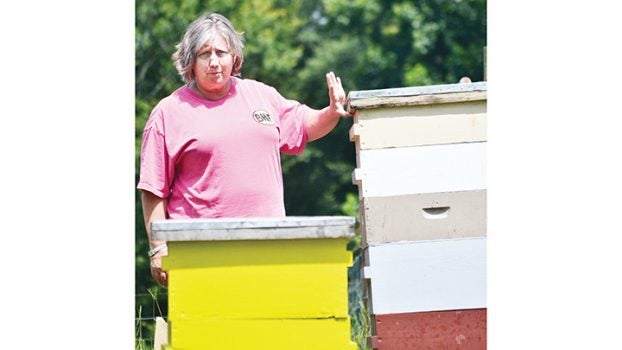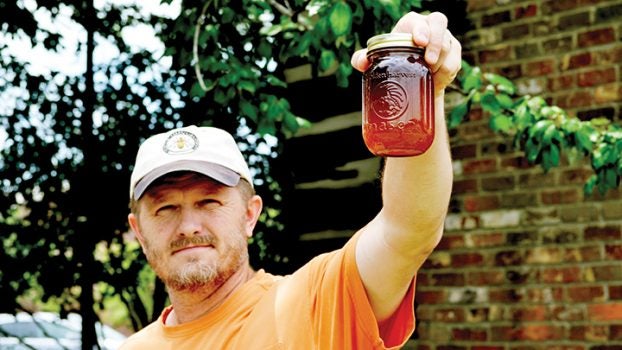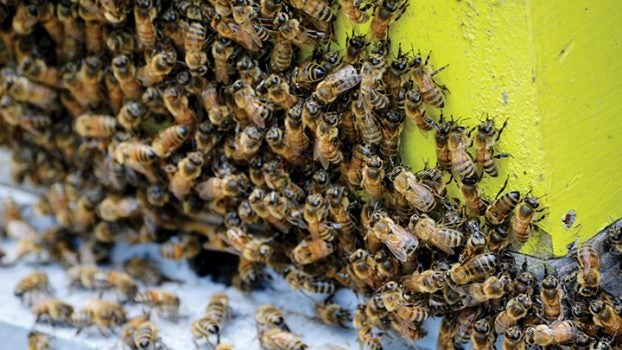They turned hobby into sweet business — Beekeeping family slings honey for fun and profit
Published 10:53 pm Friday, June 22, 2018
John Whittaker has learned the secret to success is keeping the queen happy.
That’s why when Whittaker’s wife, Pam, suggested he and her father, George Philyaw, become beekeepers, he was all in.
The trio started Broken House Farms a decade ago with a few hives and big dreams. They may not be rolling in dough, but they’ve got plenty of honey on their hands. Broken House produces about 150 to 200 gallons of honey a season, called a flow.
They sell from the farm at 2889 Lake Lincoln Road, at the Brookhaven Farmers Market and at various stores in Wesson and Lincoln County. They are active members of the Mississippi Beekeepers Association and the American Beekeepers Association.
When they started 10 years ago, they didn’t know a lot about the craft. They’ve since picked up the tricks of the trade and raise their own bees as well as collect honey. They have more than 50 hives in operation.
“We originally started buying bees, then we learned how to raise our own and how to make queens ourselves,” John Whittaker said.
Sometimes they buy queens to change the genetics of the hives.
While Philyaw is retired, the Whittakers still work full-time jobs. Pam, a former teacher, is a social worker at Berean Children’s Home. John is an investigator with the district attorney’s office.
Honey flows are March to June and late September to early November. The taste and color of the honey is different depending on which flow it’s from. Spring flows are lighter and sweeter. Fall flows tend to be darker because bees visit asters and goldenrod. It’s slightly sweet and mild.
The hives are built so the queen — who is larger than the worker bees — is physically unable to get into the top, so she can’t lay eggs in the honeycombs. The worker bees — who are all female — put their nectar in the honeycombs. The Whittakers and Philyaw rob the hives — the correct term is harvest — to get the sticky sweet stuff that ends up on their customer’s biscuits and in their tea, coffee and barbecue sauce.
Of the nearly 200 gallons of honey collected in a flow, they give some back to the bees, Pam Whittaker said.
“We don’t completely rob them. We give them something to live off of,” her husband added.
“The main thing is to keep the bees not stressed out,” she said. “We want to keep them as happy as possible.”
They use a smoke gun to calm the bees when they’re pulling honey. Sometimes they can work a hive in plain clothes, sometimes they have to wear the traditional garb that covers their face and skin.
They get stung a lot.
“If you’re allergic to bees, I’d recommend you don’t bee keep,” John Whittaker said.
The queen’s choice of boyfriends determines the attitude of the hive. When the virgin queen goes on her maiden flight, she can breed with 10 to 20 drones.
“The drones that she breeds with determines, pretty much, how nice this hive is going to be,” he said.
The queen only breeds that one flight. She stays in the hive the rest of her time.
“During this time of year, if she’s a good queen she’ll lay anywhere from 1,500 to 2,000 eggs a day,” he said.
She’ll slow down in July and August when it’s hot. She’ll pick it up again in the fall, and then slow down in the colder winter months.
Queens can live about five years, but they replace the queen every two years to improve the genetics of the hive. And while she’s important because she’s laying the eggs, she’s not the one calling the shots.
It’s the worker bees — which are infertile — that make the honey. They bring nectar back from local flowers. They’ll pollinate up to five miles from the hive.
“She’s bigger and she lays eggs, but she is not in charge,” he said.
It’s the worker bees who control the hive. If they’re not happy with the queen for some reason, like she’s not laying enough eggs, they’ll get rid of her.
“They’ll make another queen to replace her,” he said. “When it hatches, it will kill her.”
Queens can get stressed easy, too.
“If you’ve got a queen that’s got a problem, or she’s bred with the wrong drone, they’re a little more agitated and stressed,” he said. “They get stressed real easy and when they get stressed, they tend to take it out on other things other than themselves.”
The Whittakers have learned much about honey.
Grocery store honey that’s mass produced tends to be cut with an additive, like corn syrup, he said. It also keeps it from crystallizing on the shelf. Real raw honey will crystallize, which can be reversed by running the jar under hot water.
He also warns about microwaving natural honey.
“If you microwave it, you kill everything good in it. You have nothing but a flavor,” he said.








